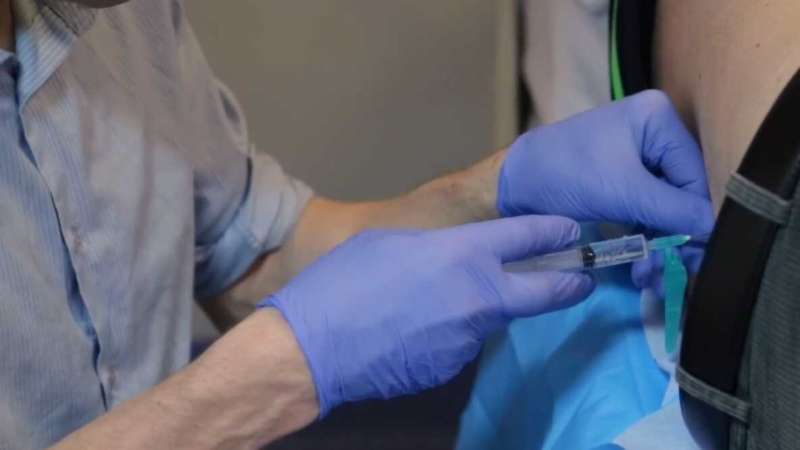This article has been reviewed according to Science X's editorial process and policies. Editors have highlighted the following attributes while ensuring the content's credibility:
fact-checked
peer-reviewed publication
trusted source
proofread
FDA approves drug that helps slow progression of rare form of motor neuron disease

The Food and Drug Administration (FDA) in the U.S. has authorized the first approved drug for a rare form of motor neuron disease (MND) based on the results of a Phase 3 clinical trial completed at the University of Sheffield, the U.K. center for the international trial.
Results from the Phase 3 clinical trial, led in the U.K. by Professor Dame Pamela Shaw, Director of the Neuroscience Institute and the Sheffield Institute for Translational Neuroscience (SITraN) and Professor Chris McDermott, Professor of Translational Neurology at the University of Sheffield, showed patients with the faulty SOD1 gene often noticed a slowing of the progression of their symptoms and in some cases improvement of muscle strength after taking the investigational drug QALSODY, formerly known as Tofersen.
Biotechnology company Biogen Inc. is responsible for bringing the new drug to the U.S. market and researchers expect applications for U.K. and EU approvals to be submitted in the near future.
This is a major scientific advance as the first treatment to target a genetic cause of MND and will change the way researchers conduct clinical trials in MND in the future.
The trial included 108 MND patients known to have the faulty SOD1 gene. Although a significant clinical improvement was not found at the primary endpoint of the study at 28 weeks, when the monitoring period was extended to 52 weeks, notable clinical improvements were observed in terms of muscle strength, breathing function and disability levels.
Professor Dame Pamela Shaw from the University of Sheffield, said, "I have conducted more than 25 MND clinical trials and this is the first trial in which patients have reported an improvement in their muscle strength.
"Never before have I heard patients say 'I am doing things today that I couldn't do a few months ago—walking up the garden steps or writing Christmas cards.' For me this is an important treatment milestone."
She added, "This trial taught us that we can see changes in biochemistry within 2–3 months but we have to be a bit more patient to see the significant clinical changes.
"We found that we can reduce or slow damage from happening biologically, but it takes more time for the motor neurons to heal and regenerate their connections with the muscles. So, the motor system needs time to heal before we see a significant clinical change.
"Although not yet approved for use in the U.K. and Europe, FDA approval is a major scientific development. While awaiting the regulatory permissions to prescribe QALSODY, Biogen are making the treatment available for patients with a confirmed SOD1 mutation through an expanded access program."
Results of the Phase 3 clinical trial (VALOR), published in the New England Journal of Medicine, showed that biomarkers in patients' cerebrospinal fluid showed a reduction in the SOD1 and neurofilament protein levels after taking QALSODY for six months. This suggests that the treatment successfully hits the therapeutic target and reduces loss of motor neurons, which may allow them to start regenerating connections with muscles in the body. However, it took longer for patients to experience improved muscle strength.
Patients receive QALSODY as an injection into the cerebrospinal fluid by lumbar puncture every four weeks. The drug was found to be generally safe, though a small number of patients developed reversible inflammation of the spinal cord or nerve roots.
Researchers now hope that the FDA approval will help to pave the way for approvals in other countries and for new treatments tackling other genetic causes of MND to be developed. The results from this landmark trial will improve the clinical trial landscape for MND generally and allow researchers to measure whether an experimental treatment is beneficial much more quickly than has been possible up until now.




















